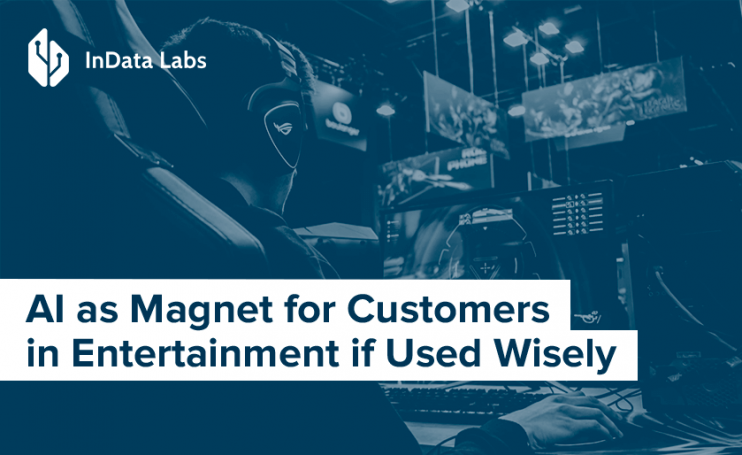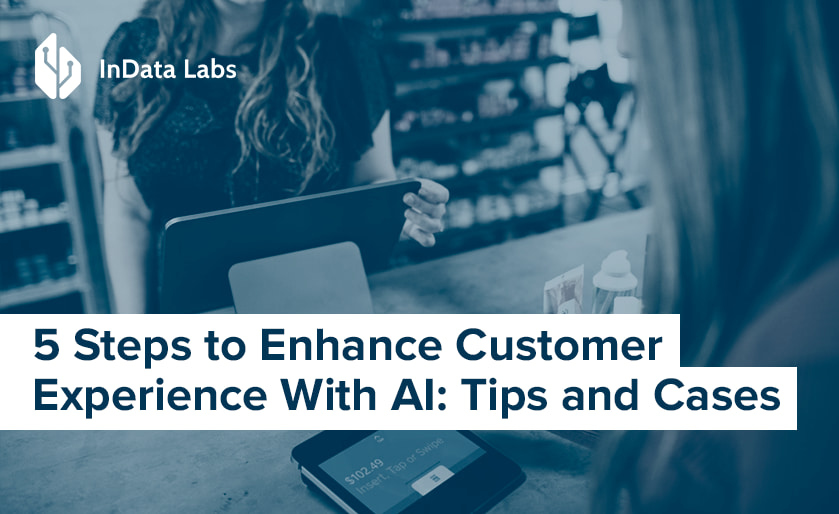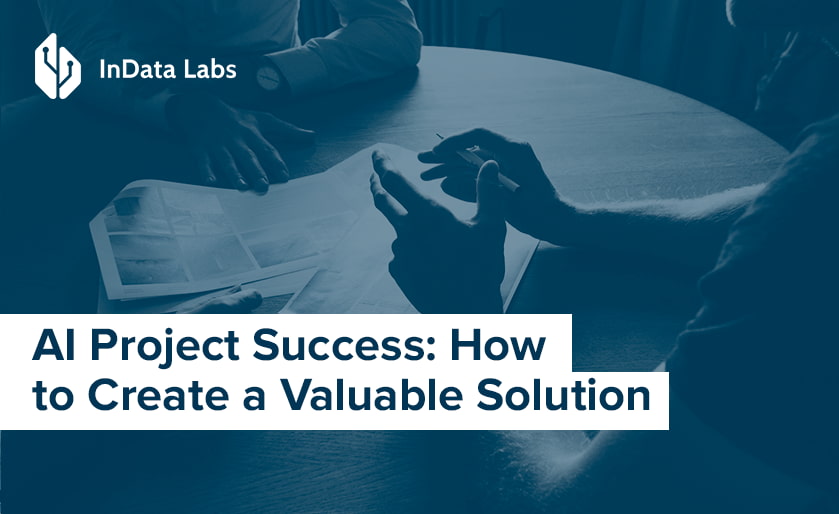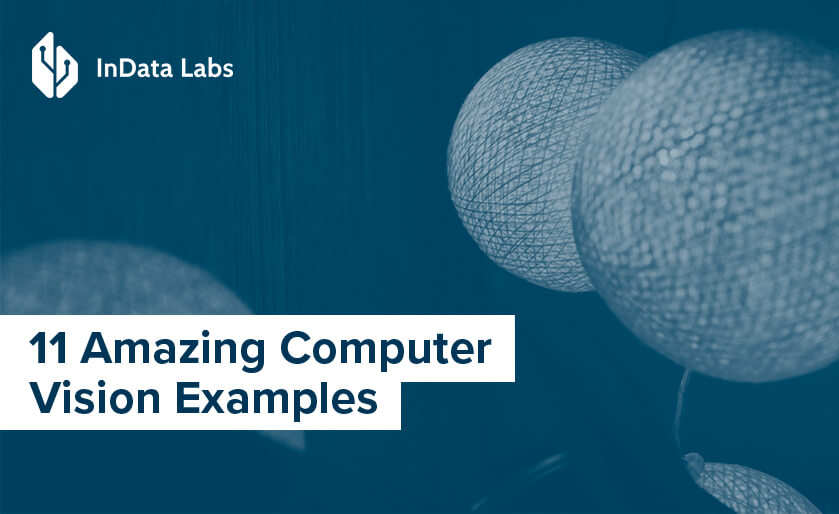The entertainment industry goes on flourishing, and AI has provided its input into it. Many experts across sectors, such as game development, movie production, advertising, and also providers of a variety of entertainment services, agree on AI unleashing an entirely new approach to creativity. In 2020, organizations in the entertainment industry will apply AI to drive investments and place focus on supplying high-quality content that answers viewer demand.
Robots and augmented intelligence find applications in entertaining consumers and providing them with a memorable next-generation experience. Entertainment and tech giants, such as Blizzard Entertainment, Walt Disney World, Google, Microsoft, Intel, are involved in creating, launching, and fine-tuning AI-driven innovations in the entertainment field.
In this article, InData Labs, as a provider of AI software development solutions, is going to expose you to what AI means for entertainment today. We will review the role of AI in popular games, AI in entertainment, its uses for marketing and advertising purposes, for customer experience, and service provision. Learn how your business can benefit from the technology.
AI vs. Professional Gamers
Everybody is talking about AI breakthroughs in mastering intellectual games. It was bound to happen in the field of entertainment. AI and machine learning rely on massive data sets to analyze and predict future scenarios the way far beyond human capabilities.
First, Google DeepMind created AlphaGo that defeated the human world champion of the game Go Lee Se-dol who later announced his retirement because of AI. Lee said that even in case he becomes better than any other human player, there is always a machine to be the winner.
Second, another invention by Google AlphaStar AI was trained to play StarCraft II, a game involving myriad strategies and requiring a player to come up with tricks and tactics. They employed a neural network using reinforcement learning so that the computer could get back to plays and learn from previous experience. However, this time, AI did not demonstrate as a brilliant performance as it was expected. The AI triumph in this game grabbed media headlines, but the victory turned out to be a great exaggeration.
AlphaStar developers claimed that AI defeated some strongest professional players, but in fact, it did not compete against the top ones. But one the other hand, the AI demonstrated truly outstanding techniques in a very complex game. To delve into the details, you can read on here about AlphaStar facing progress and setbacks.

Source: Escapistmagazine.com
What is most important about AI in games is the fact that AI is not omnipotent, but enthusiastic professional teams work to set the stage for new milestones. Next time it can be AI in the game of poker, which it has already started to master, and not without success.
Navigating in The Sea of AI Applications in Entertainment
The technology allows both businesses and individuals in the entertainment industry to use artificial intelligence and augmented intelligence for media content platforms, target marketing, content personalization, in film production, TV, games, gambling, and on and on. Overall, we can split all the purposes of applying AI in different workflows into three categories.
Marketing and Advertising
Endless flows of ads come from all sides. Such aggressive advertising can annoy and irritate users. The goal of a good marketer is to find the key to the heart of a consumer. And the best option here is to offer what consumers really need based on their interests, purchasing preferences, age, origin, and many other factors.
Companies are using machine learning, deep learning, and computer vision technology to launch smart marketing campaigns and to expose a brand to a broader audience. They analyze consumer sentiment to use the information for scaling up and improving services.
You can learn more about the business benefits of sentiment analysis from InData Labs Blog. And here you can review the the examples of using computer vision across industries.
Experience and Personalization
Customer experience can boost business growth or ruin all efforts made to attract more loyal clients and make a brand recognizable. And knowing that, providers of entertainment services and products use machine learning and deep learning to create robust recommender systems, analyze, and predict customer behavior. By drawing on big data, those systems help deliver personalized content, recommendations, and suggestions to the target audience. Giving users the feeling of being served on a case-by-case basis, like VIPs, allows business owners to have customers talking about brands and contributing to the increase in the conversion rate.
Another tech-driven trend in AI in entertainment is the provision of the immersive experience. Marketers use that term to describe the use of AI in entertainment in forms of AR, VR, and mixed reality. You are welcome to discover more about augmented intelligence for consumer experience in our blog.
Search Optimization
Adopting AI enables the automatic optimization of text, visual, and voice search, and eases the delivery of some most relevant search results. The technology has a significant impact on how search engines rank content and how consumers find brands.
AI-driven search engines make brand owners pay extra attention to how their media content gets organized across websites if they want to be sure that the system will demonstrate the right content to the right consumer. So, the relevance of information and the consistency with search engine restrictions, today more than ever, influence brand image and the average audience coverage.
Practical Examples of Artificial Intelligence in Entertainment
Applications of AI in the entertainment industry range from game augmentation to movie recognition, to action detection. Without further ado, let’s plunge into the real-life projects completed by the InData Labs team.
Automated Gathering and Analysis of Reviews by Gamers
Many gamers are avid users of social media, especially forums containing topic threads and news dedicated to games. They share feedback and opinions, and their activity results in the massive amount of content that can be used by product developers to grasp and anticipate the needs of their target audience better.
All the big data can be efficiently processed with the help of AI. And game developers can retrieve information on such aspects of games as interface, engine, bugs, pricing, and on. The automation of review gathering is time- and resource-saving and allows the relocation of valuable human workforces on the tasks requiring human creativity and supervision.
Real-Time Object Detection During Entertainment Events

Source: Sportspromedia.com
Top-notch computer vision capabilities make it possible to use object detection for marketing purposes. That can imply detecting brand logos on sports gear or billboards placed around venues. Such sources of data are of value for marketing teams running campaigns to increase brand awareness.
Object detection models are based on neural networks that enable recognition and targeting in real-time, even in cases of blurred images or image noise. Users can run the networks on their mobile devices across platforms.
Another goal of applying AI and computer vision is action recognition. Intelligent solutions have the capacity to predict what a player is doing at a given moment and foresee tense moments during an event. Delivering the experience of a new kind to fans is a guarantee.
AI in Gambling
Representatives of the gambling industry also enjoy the privileges that the use of AI entails. For instance, sports betting companies and internet gambling platforms employ solutions fueled by AI to maximize their efforts in building trust with sports fans.

Source: Cambiumllp.com
AI-driven solutions help them predict customer churn, which is an acute need for businesses in the niche where customers are very dynamic, new players come and go, and churn rates can reach 40%. For marketing teams, it is vital to retain newcomers to ensure the future stable growth of businesses. Intelligent churn prediction models can help face that arduous challenge.
AI uses customer profile data, involving their activities and preferences, and vast historical data to generate predictions. Custom AI solutions give organizations a chance to increase the retention rate by half and even more.
Movie Recommendation Engine
Giving personal recommendations to every user is the key to attract and retain customers. It can be extremely tough, especially if your business is running an entertainment platform with more than 7000 items of content. With AI now able to automatically pick and deliver content to the right consumer, advanced personalization is a feasible way to stay ahead of competitors.
By adding a personal touch, business owners can dramatically improve customer experience and help customers get just what they want in a matter of seconds. And the conversion rate will go up.
Bottom Line
Artificial intelligence in entertainment is a powerful engine for far-reaching changes reshaping the landscape of the industry. It will not take long for augmented intelligence, interactive games, and immersive experience to become widely available.
The technology introduces a new kind of reality, and entertainment companies adopt innovative approaches to the processes of creation and production, content generation, and ways of interacting with consumers. Businesses in that AI-driven industry need robust solutions and tech-savvy engineering teams ready to assist with taming cutting-edge technologies.
InData Labs is at the forefront in helping clients to fulfill their project ideas in the field of AI and big data. We welcome you to develop and enhance your business with us.



